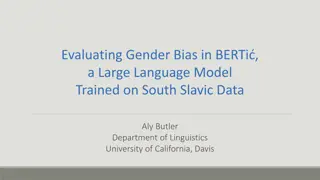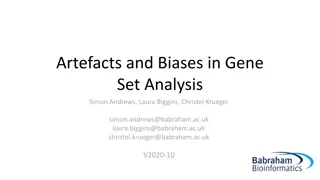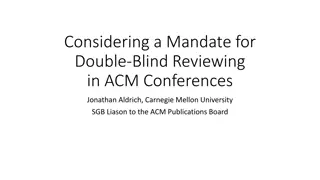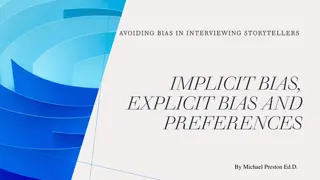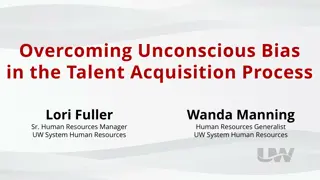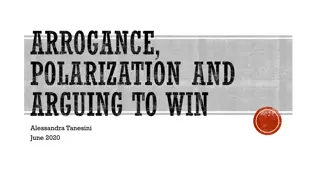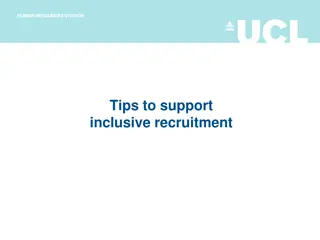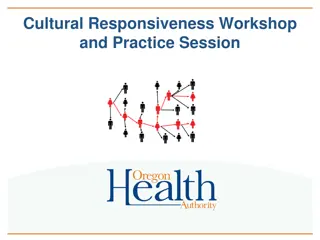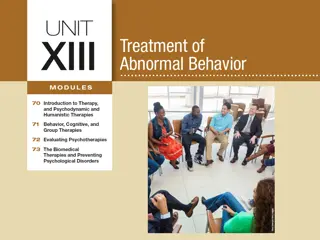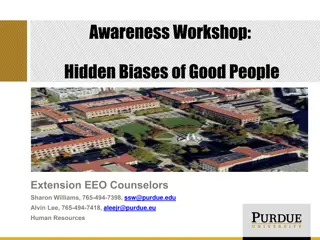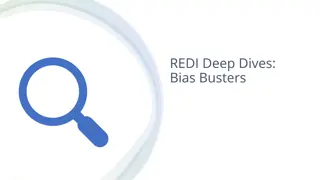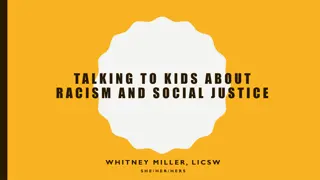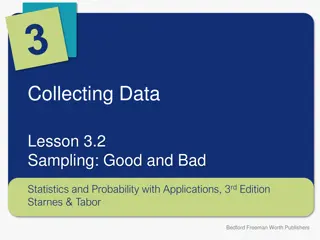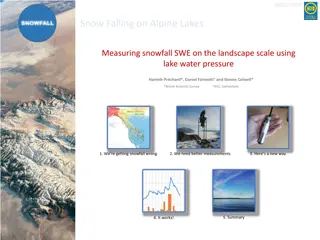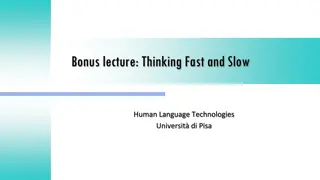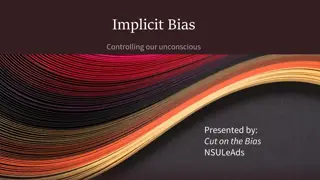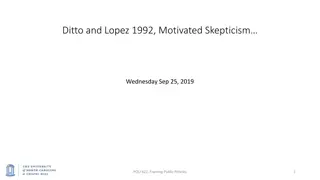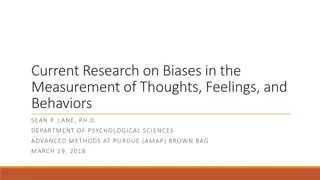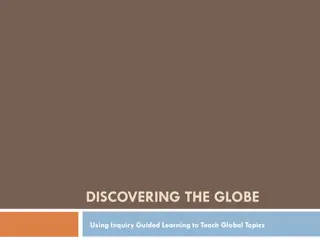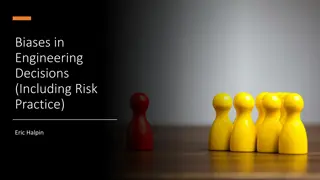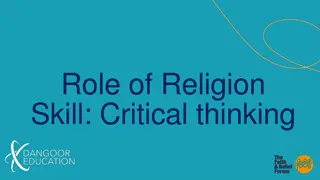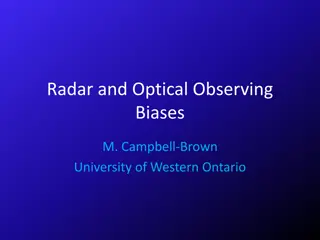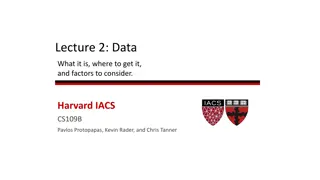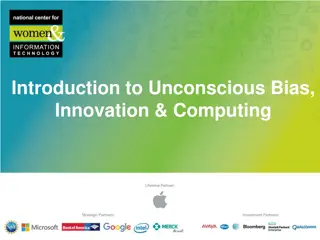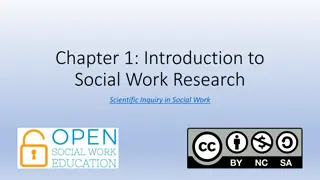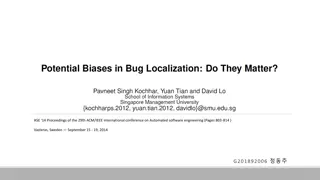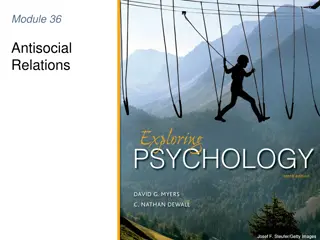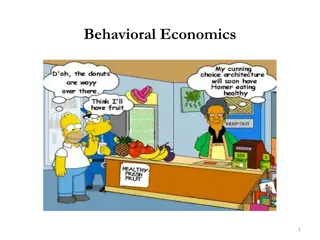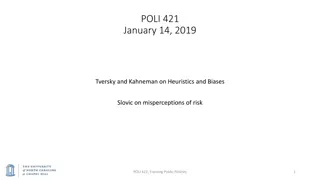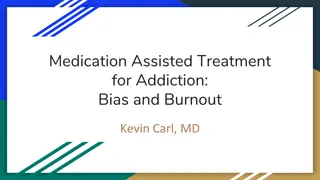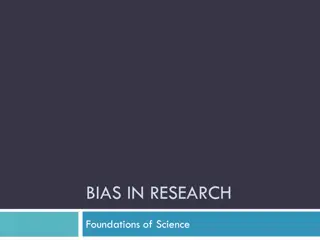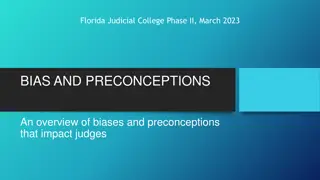Understanding Intersectionality in AI: Analyzing Biases in Generative Systems
Machine learning in AI can perpetuate biases related to race and gender. This workshop explores the concept of intersectionality to analyze how AI-generated avatars represent identities based on race, gender, and ethnicity. Participants will learn to recognize biases in generative AI and develop cri
4 views • 25 slides
Evaluating Gender Bias in BERTi: Insights on Large Language Models
This study delves into gender bias evaluation in BERTi, a large language model trained on South Slavic data. It explores issues in language modeling, the impact of social biases in artificial intelligence, and training processes of Large Language Models (LLMs). Additionally, it discusses how LLMs le
11 views • 16 slides
Recognizing Hidden Bias in the Workplace
In the workplace, hidden bias, also known as implicit bias, can significantly impact hiring, employment decisions, and overall workplace dynamics. Deloitte's 2019 State of Inclusion Survey revealed that a substantial percentage of workers experienced bias at least monthly. Hidden biases can be based
3 views • 18 slides
Challenges and Solutions in Implementing Historical Competencies in Teaching
Explore the complexities and obstacles faced in implementing historical competencies in teaching, as discussed by Jens Aage Poulsen, a senior lecturer and researcher at HistoryLab, University College Lillebaelt, Denmark. The content delves into competence-based curriculum, core historical competenci
0 views • 7 slides
Understanding Hammurabi's Code: Rich vs. Poor, Men vs. Women, and Biases
Explore the ancient laws of Hammurabi's Code and their implications on social classes and gender roles. Uncover how the rich were treated differently from the poor and how men held greater rights than women under this legal system. Analyze the biases of Hammurabi, a wealthy king, and understand how
0 views • 12 slides
Understanding Artefacts and Biases in Gene Set Analysis
Gene set enrichment tests help identify functional gene sets enriched in hit lists compared to background sets. Various biases (technical, biological, statistical) can lead to incorrect conclusions in data analysis, emphasizing the importance of recognizing and addressing them. Technical biases like
0 views • 29 slides
Implementing Blind Evaluation Pilot in HORIZON EUROPE: Key Facts and Process
HORIZON EUROPE is conducting a pilot on Blind Evaluation in the 2023-2024 work program to address biases in the research and innovation evaluation process. The pilot aims to assess the feasibility of blind evaluations in ensuring fairness and mitigating potential biases towards well-known organizati
9 views • 9 slides
Enhancing Peer Review Quality Through Double-Blind Reviewing in ACM Conferences
Double-blind reviewing (DBR) is increasingly recognized for its effectiveness in reducing biases, improving article quality, and practicality in ACM conferences. Studies show evidence of gender and institutional biases in single-blind reviewing, while DBR enhances fairness and credibility. DBR revie
0 views • 9 slides
Understanding and Overcoming Bias in Interviewing
Bias in interviewing can arise from implicit and explicit prejudices, impacting perceptions and interactions with interviewees. Implicit biases are unconscious, while explicit biases are deliberate. Recognizing and addressing biases is essential to conduct fair and effective interviews. Examples ill
0 views • 17 slides
Overcoming Unconscious Bias in Talent Acquisition Process
Overcoming Unconscious Bias in Talent Acquisition Process emphasizes the importance of addressing unconscious bias in hiring practices through awareness and control. The content delves into defining unconscious bias, its impact on diversity, examples, and strategies for managing bias. The University
0 views • 19 slides
The Impact of Arrogance and Polarization on Group Deliberation
Individuals' biases and tendencies towards arrogance and overconfidence can hinder good group deliberation. The motivation to argue for learning, rather than winning, contributes to better group discussions. Understanding biases as features rather than bugs can lead to improved group judgment. Indiv
0 views • 19 slides
Effective Tips for Inclusive Recruitment Process
Effective inclusive recruitment requires avoiding biases, implementing positive action, using structured methods, fair short-listing, asking good interview questions, having model answers, and assessing candidates objectively. Overcoming biases and promoting diversity are essential to hiring the bes
0 views • 11 slides
Exploring Cultural Responsiveness Through Workshops & Practice Sessions
This content provides a comprehensive guide on cultural responsiveness through workshops and practice sessions. It covers topics like cultural sensitivity, biases identification, and ways to reduce implicit biases. Resources, videos, and insights on cultural knowledge and awareness are shared to pro
0 views • 19 slides
Evaluating the Effectiveness of Psychotherapy: Evidence and Critiques
Evidence suggests that psychotherapy works for many individuals, with high satisfaction rates reported. Critics, however, raise concerns about placebo effects, therapist biases, and human biases influencing perceptions of success. Clinicians acknowledge successful cases but remain cautious of cognit
0 views • 36 slides
Understanding Hammurabi's Code: Rich vs. Poor, Men vs. Women, and Biases
Explore the ancient laws of Hammurabi's Code and analyze how they differentiated punishments based on social status and gender. Learn about the biases of King Hammurabi and how they influenced the legal system he established in Mesopotamia. Delve into the historical context to understand the unequal
0 views • 12 slides
Hidden Biases Awareness Workshop: Exploring Unconscious Prejudices
Delve into the complexities of hidden biases through an insightful workshop discussing stereotypes, microaggressions, and unconscious prejudice. This session aims to raise awareness, encourage dialogue, and provide resources for personal development in diversity and inclusion. Explore real-world exa
0 views • 12 slides
REDI Deep Dives: Bias Busters Activity
Engage your team in activities to uncover implicit biases and promote equity and inclusivity. This slideshow resource guides participants through reflection and discussions on bias impact on decision-making. Learn how to recognize and address biases within a group setting for a more resilient and in
0 views • 12 slides
Talking to Kids About Racism and Social Justice with Whitney Miller, LICSW
Discussing racism and social justice with kids requires acknowledging inequities, understanding biases, creating safe spaces, storytelling to unlearn dominant narratives, exposing children to diverse content, and engaging in social justice activities as a family. Whitney Miller emphasizes the import
1 views • 7 slides
Understanding Biases in Sampling Methods
Statistical studies rely on samples to draw conclusions about populations, but the method of sampling can introduce biases. This text discusses convenience sampling, voluntary response sampling, random sampling, and the implications of biased sampling methods on study results. It highlights how bias
1 views • 12 slides
Revolutionizing Snowfall Measurement Using Alpine Lakes
Snowfall measurement in mountainous regions has been challenging due to biases in existing methods. A new approach utilizing lake water pressure sensors offers a cost-effective, accurate, and landscape-scale solution. By monitoring changes in water pressure during winter, researchers can estimate sn
0 views • 6 slides
Cognitive Biases and Decision Making: An Exploration of Human Psychology
Explore the fascinating realm of cognitive biases and decision-making through various mind-bending puzzles and scenarios. Dive into concepts such as fast and slow thinking, logical reasoning, and the impact of biases on our everyday choices. Challenge your cognitive reflection with intriguing questi
0 views • 14 slides
Understanding Implicit Bias and Overcoming Negative Biases
Implicit bias influences attitudes and behaviors unconsciously. Learn about its key characteristics, testing methods like the Implicit Association Test, and how to combat negative biases through mindfulness techniques. Explore real-world examples and strategies to address biases effectively.
0 views • 19 slides
Understanding Motivated Skepticism in Public Policy Framing
Exploring how individuals display motivated skepticism in evaluating information related to public policies and medical news, influencing their decisions and perceptions. The phenomenon is examined through studies highlighting biases towards preferred information, impacting how individuals rate inte
0 views • 9 slides
Biases in Measurement of Thoughts, Feelings, and Behaviors: Current Research Insights
Current research explores biases in measuring thoughts, feelings, and behaviors, focusing on the attenuation effect observed in subsequent reports. This effect, illustrated through various studies and examples, highlights a decrease in reported symptoms over time, potentially influenced by measureme
0 views • 41 slides
Understanding Psychological Challenges in Teaching Global Perspectives
Exploring the impact of psychological biases like actor-observer bias, confirmation bias, and cognitive dissonance on teaching global perspectives. Insights from James Dawes shed light on how our perceptions and judgments are influenced by internal biases, affecting our ability to embrace diversity
0 views • 31 slides
Managing Biases in Engineering Decisions - Strategies and Tools
Dive into the complexities of biases in engineering decisions, particularly in risk assessment, and explore ways to identify, understand, and manage biases effectively. Discover insightful strategies, responsibilities, and tools to mitigate biases and enhance decision-making processes in engineering
0 views • 11 slides
Enhancing Critical Thinking Through Examining the Role of Religion
Explore the role of religion in developing critical thinking skills by identifying biases, critically evaluating information sources, and fostering nuanced perspectives. Reflect on personal biases, sources of information, and engagement with controversial issues. Enhance critical thinking by analyzi
0 views • 12 slides
Understanding Radar and Optical Observing Biases in Meteor Detection
Exploring radar and optical observing biases in meteor detection, this content delves into factors affecting mass detection, ionization efficiency, transverse radar effects, and more. Gain insights into how radar technology plays a crucial role in determining meteor properties and overcoming observa
1 views • 13 slides
Understanding Data: Types, Sources, and Considerations
This lecture delves into the concept of data, covering its types, sources, and factors to consider when working with it. Learn how to select appropriate data, be mindful of biases, refine inquiries effectively, and parse text using regular expressions. The content explores what data is, its formats,
0 views • 84 slides
Enhancing Engagement and Addressing Biases in Family-Centered Support
Explore the significance of active listening, engagement, and combating biases in supporting families within the child welfare system. Learn about the importance of involving parents and caregivers, understanding biases, and implementing strategies to reduce implicit bias. Emphasizing family voices
1 views • 18 slides
Addressing Diversity Disparities in Tech Through Unconscious Bias Awareness
In the tech industry, diversity remains low despite its proven benefits in innovation and problem-solving. This presentation reveals shocking statistics on the underrepresentation of women and minority groups in computing fields. It emphasizes that societal bias, not inherent flaws in minority group
0 views • 15 slides
Understanding Social Work Research and Evidence-Based Practice
Explore the significance of social work research, cognitive biases, objectivity vs. subjectivity, and evidence-based practice. Learn how social workers gather knowledge, apply cognitive biases, distinguish between subjective and objective truths, and utilize evidence-based practice to enhance client
0 views • 9 slides
Investigating Biases in Bug Localization Studies: A Critical Analysis
This research delves into potential biases affecting bug localization studies in software development. It explores misclassification of bug reports, pre-localized reports, and issues with ground truth files, shedding light on the challenges in accurately predicting and localizing software bugs.
0 views • 47 slides
Understanding Prejudice: Roots, Manifestations, and Impact on Society
Prejudice is an unjustified negative attitude towards a group, stemming from beliefs, emotions, and predispositions to discriminate. This negative behavior can lead to discrimination, affecting various aspects of society such as job opportunities and relationships. Despite a decline in overt prejudi
0 views • 20 slides
Understanding Behavioral Economics and Decision Making
Behavioral economics challenges the traditional rational agent model by incorporating insights from psychology into economic behavior analysis. This approach reveals systematic biases and departures from rational decision-making, leading to a better understanding of why people make certain choices.
0 views • 16 slides
Understanding Cognitive Biases in Decision Making
Explore Tversky and Kahneman's research on heuristics and biases, Slovic's insights on risk misperceptions, and the implications of cognitive biases in decision-making processes. Delve into topics such as representativeness, availability bias, anchoring, and Prospect Theory by Kahneman and Tversky.
0 views • 12 slides
Understanding Medication Assisted Treatment (MAT) for Addiction
Medication Assisted Treatment (MAT) combines medications with counseling and therapies to treat substance use disorders. This approach challenges historical biases and stigma around addiction, offering effective options like Methadone, Naltrexone, and Buprenorphine for opioid addiction. Despite bias
0 views • 16 slides
Uncovering Bias in Research: Foundation of Science
Exploring the presence of bias in research, this compilation delves into various types of biases such as confirmation bias and fundamental attribution error. It also addresses the challenges of explaining behaviors rooted in biases and offers insights on reducing bias in the scientific process. Thro
0 views • 6 slides
Understanding Biases and Preconceptions in Judicial Decision-Making
Explore the impact of biases and preconceptions on judges, including definitions of bias, prejudice, and implicit bias. Learn how past experiences can influence judicial duties and the importance of judges being aware of their perspectives. Discover exercises to identify biases and potential issues
0 views • 12 slides
Unpacking Biases and Tackling ISMs in Life
We all carry biases and opinions that influence our decisions. Learning to separate bias from stereotype is crucial for making informed choices. This course delves into identifying and addressing biases to combat ageism, sexism, racism, classism, and homophobia in society.
0 views • 10 slides

